Is voluntourism a good idea? Things to consider
Have you ever combined travel with volunteering? Or are you considering signing up for a voluntourism experience? If so, here are some things you should think about first.
But before I even start to look at this question, a disclosure: I’ve done the kind of volunteer work I’ll be discussing below.
- My first experience was, in a way, the ultimate voluntourism. I spent two years in the Peace Corps in Malawi back in the 1980s, where I worked as a teacher in a secondary school.
- In 2009 I took part in an Edukans project, helping conduct a two-week professional development workshop for all the secondary school English teachers in Kirundo, Burundi.
- When I returned to Malawi in 2012, I spent a week leading a professional development workshop for a secondary school’s staff. At the same time, my kids helped out at an orphanage next door. Each day, after my workshop, I’d go join them at the orphanage and would spend an hour or so helping feed the children lunch.
In other words, when I express criticism of voluntourism, it applies to myself as well.
Definition of “west,” “western” and “global north”
I’m using these terms to mean countries with high levels of development, good health care, healthy water supplies, strong economies, stable political systems, and so on. It applies to North America, much of Europe, Australia, New Zealand, and other similarly prosperous places.
Disclosure: This article contains affiliate links. If you click on one and spend money, I will receive a small commission.
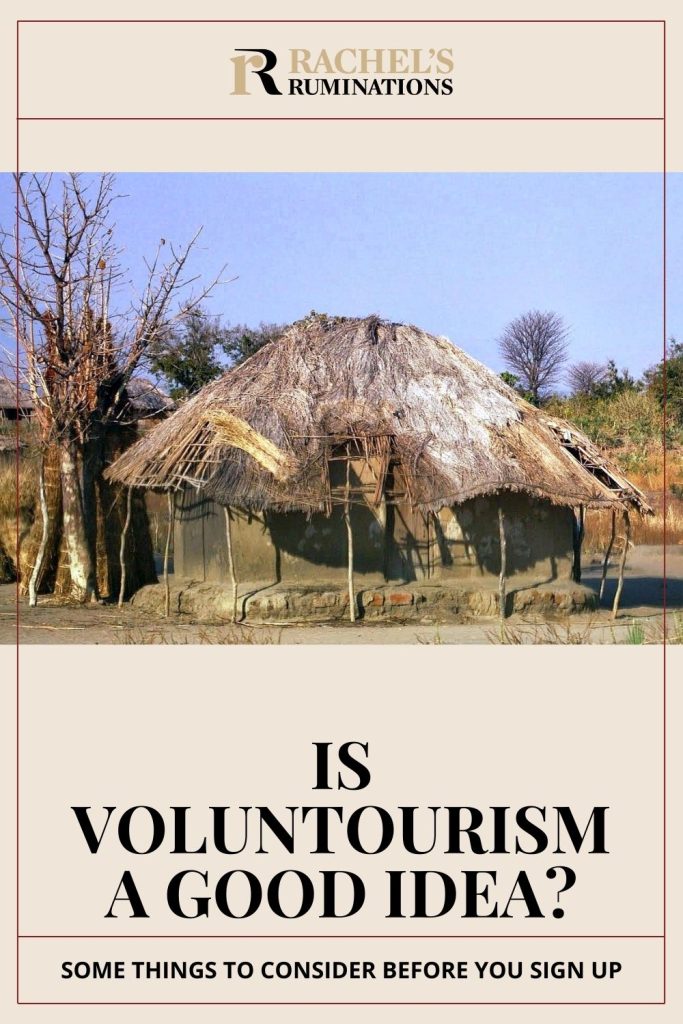
Arguments for voluntourism
There are several arguments to be made in favor of voluntourism:
- It’s an eye-opening experience for the volunteers. They get a glimpse of how other people – usually poorer people – live. This helps them develop some amount of compassion and understanding of the difficulties people in other places face. Many of us in the west live fairly parochial lives. We tend to view our own way of life as “best” and “normal.” Exposure to a different culture can allow us to see that other ways of doing things may also be good.
- Additionally, spending time in a country as a volunteer creates an emotional connection between you and that country. I certainly still feel affection and concern for Malawi and its future, even after all these years.
- Voluntourists sometimes learn skills they wouldn’t have otherwise been exposed to. I had no intention to be a teacher until the Peace Corps put me in a teaching position. I loved it from the first day, and when I returned to the US, that was the career I pursued. It might also be smaller skills like cooking or bargaining at a local market or learning how to navigate foreign transit systems.
- In some situations, volunteers from outside are truly necessary. For example, if there is a natural disaster like the recent earthquake in Turkey, people need help immediately. Even if they have lots of fully-trained local people available who know how to reach earthquake victims or offer medical care or any of the many other tasks that need to happen fast, they may need more than they can provide themselves.
- Voluntourists who bring skills with them pass them on, which can change lives for the people who learn from them. A teacher volunteering in a teacher-training program or a computer technician training locals to repair computers can have a huge effect on those individuals they train.
What is the difference between “volunteering” and “voluntourism”?
For the purposes of this article, “volunteering” means doing unpaid work with the intention of helping one or more other people. “Voluntourism” is a subset of that: it’s volunteering, but you travel to do it. Usually voluntourism involves a vacation with an element of volunteering added to it. Sometimes longer-term volunteering isn’t really volunteering; it’s paid development work, providing a stipend for living expenses.
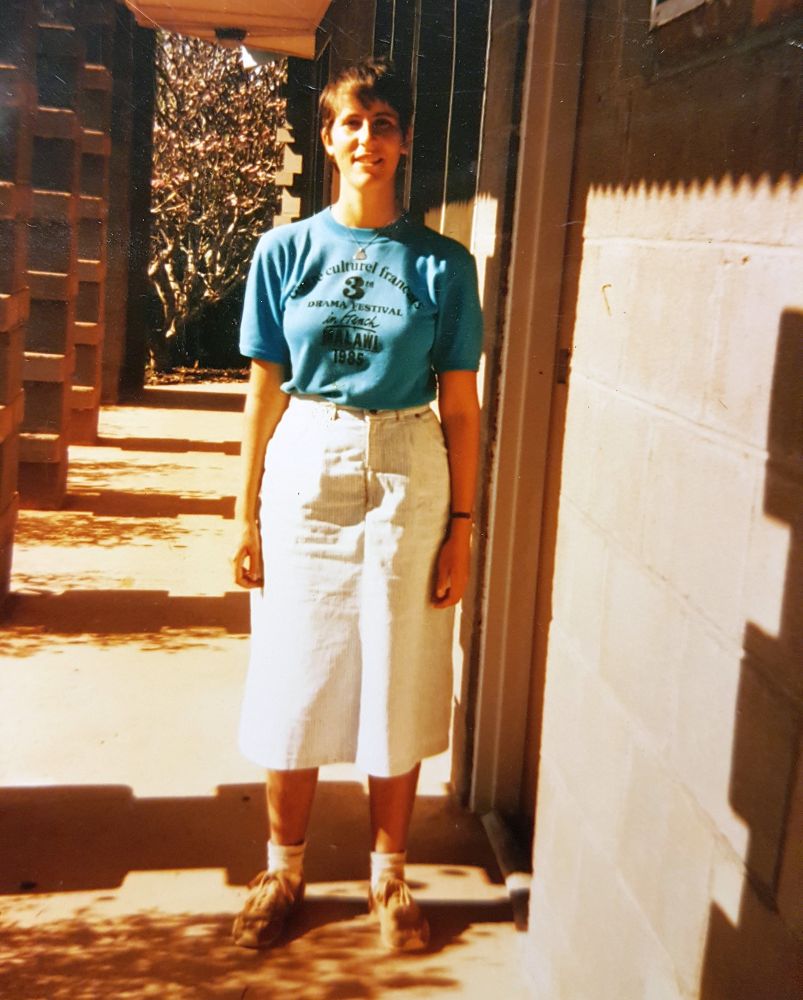
Appalling stories of voluntourism
There is a dark side to voluntourism, however. The media has covered lots of appalling stories of voluntourism gone wrong, particularly around volunteer travel to orphanages. Here’s a pretty comprehensive article and video about it, centered in Kenya, but applicable around the world.
The story of Renee Bach’s organization “Serving His Children” in Jinja, Uganda, is a case in point. She is alleged to be responsible for killing 105 children by carrying out medical procedures without training.
Orphanage tourism
In places like Vietnam and Ecuador, a whole voluntourism industry has developed around well-intended young people from the west who want to help care for poor orphans. These companies charge them for a whole package of housing and meals – often in the form of a homestay – and a “donation” for the orphanage.
It turns out, though, that often the children are not actually orphans. Instead, their parents receive a very small payment per day to let their children stay there. Or, perhaps worse, they are promised a better life for their children. The parents, made desperate by poverty and/or conflicts, agree. The conditions under which the “orphans” live may be kept intentionally poor in order to motivate visiting young volunteers to give more money.
The children, meanwhile, have to deal with an ever-changing stream of idealistic young people with the best intentions, coming and going within weeks. These volunteers are generally untrained in the tasks they’ve signed up to do. In many cases, they haven’t been vetted for, at best, an inability to do the job or, at worst, a history of pedophilia.
The volunteers are often housed in the homes of local families. This can indeed be a learning experience for these young people. They get a glimpse of how people in the country they’re visiting live. They may also see it as a way of helping – they’ve paid for the homestay, after all, helping that family earn money. However, in many cases the host families receive a pittance, and the company pockets the bulk of the money.
So the voluntourists get the positive benefits of feeling good about helping orphans, the satisfied feeling of getting to know a local family, who they’ve helped with the money they pay for the homestay, and the additional fulfillment of giving an extra donation to the orphanage. What do the “orphans” or their families get?
Not much. I’m happy to see that recently these orphanages have been receiving some media attention. Hopefully the negative coverage will put an end to this damaging industry and move attention (and funding) toward alleviating the poverty that leads to this situation.
My issue with voluntourism, though, is bigger than this.
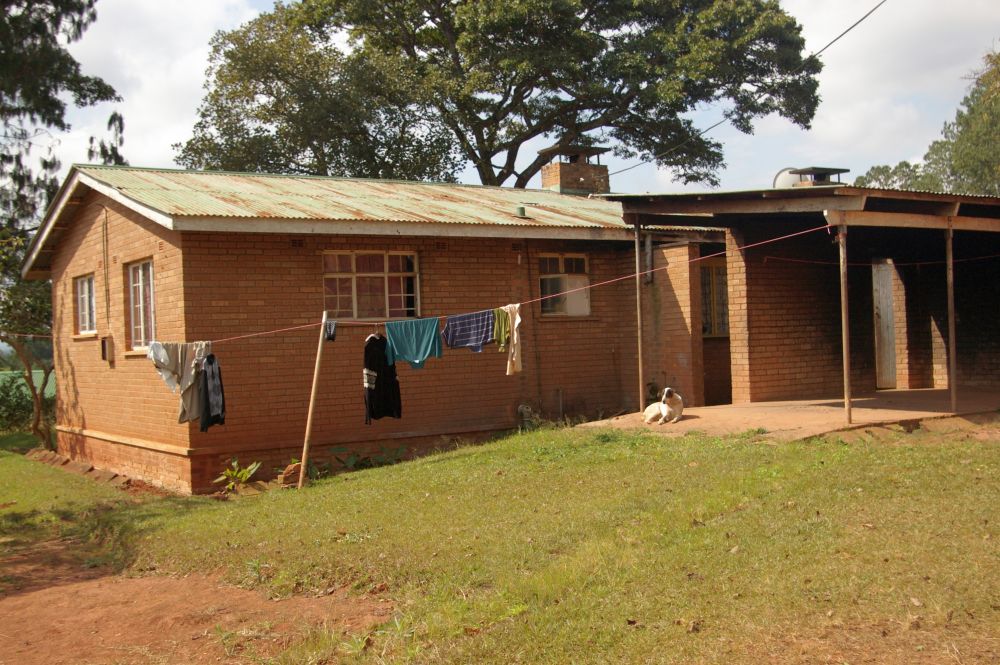
Negative impact of voluntourism
Voluntourism can be inappropriate and potentially harmful for a number of reasons:
1. The economics of voluntourism
In developing countries, international volunteers sometimes replace locals who could be getting paid for the same work. And it replaces them in a much less cost-effective way.
Where your money goes
Let’s say your church organizes a voluntourism trip to some lesser-developed country in the global south to help build a toilet block for a school. Add together the cost of all your flights, plus the hotel nights you pay for and your food, and the total is huge.
At the same time, the physical labor you do could just as well be done by a local construction company. The company could employ local people, who would receive a normal local wage. Those wages would do much more good in the local community. The workers’ kids might get to go to school, for example, and local businesses would sell them their food and other necessities. In other words, the money circulates in the local economy.
All that money you spend on airfare only goes to the airline. It’s fine to pay an airline for its services, but it doesn’t help that local economy. The same amount could probably build more toilet blocks or pay to improve the classrooms or the electrical system or pay teachers for a year or two or any of a hundred other improvements to a school in a poor, rural area.
If a company at home arranges your voluntourism for you, then they’re the ones who make money, rather than businesses in-country.
Another economic issue is that voluntourism in some places has become a whole local industry, attracting people away from, for example, subsistence agriculture. This can harm the original economic structure, even leading to food shortages.
Fundraising
And speaking of flights, many voluntourism organizations encourage volunteers to raise money for the “project.” The money they raise may be presented as being for building a house for a poor family or painting a mural in a school, for example. Yet a large amount of it is not for the project at all: it’s for the volunteer’s travel expenses. I’d like to at least see people being more honest about it: “This money is so that I can travel to this other country to take part in a project and do some sightseeing.”
Training, or lack of it
It might not be fair to look at how much money gets spent on travel expenses to go on a volunteer trip. After all, you want to travel and see the world, and would spend that money whether you volunteered or not. It’s a false equivalency: choosing not to go doesn’t mean that money will get handed over to a local organization to do the work locally.
But even if you ignore how much money it took you to get to the destination for your volunteer work, money gets spent on you when you are there, if you receive any training at all. How much time does that take out of the primary process the organization is meant to be carrying out? This seems such a waste of time when you consider that they have to run training for every new group of volunteers.
Let’s say you are going to help build that toilet block. Do you know how to lay bricks? An actual bricklayer will have to spend some of his time showing you and supervising you. That takes away from the time he could be spending actually building a wall. He’d most likely work more efficiently and more skillfully than you can. A week later, when the next group of volunteers arrives, he has to do it again.
On the other hand, given that these young idealists usually have no training for the task they’ve come to do – teaching, for example, or construction projects – you can see why some modicum of training seems necessary. Yet many voluntourism organizations don’t even offer any training at all.
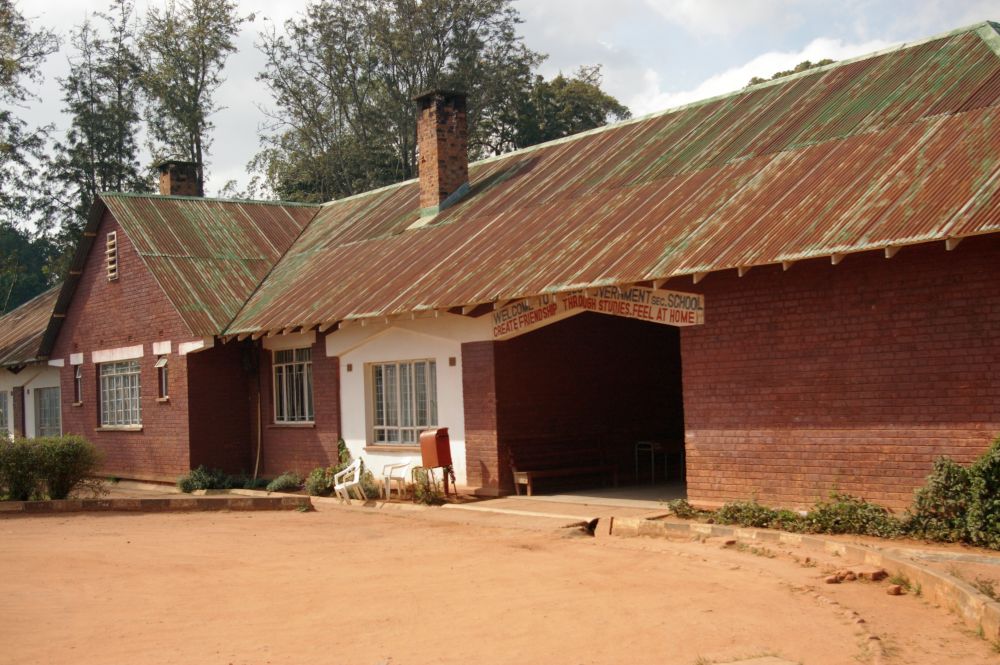
2. Motivations for voluntourism
If I asked you why you want to volunteer, you’d likely answer “I want to help people.” But why do you want to help people? Is it really that altruistic or is it because helping people makes you feel good about yourself? This is often the only lasting effect of voluntourism: a feeling of satisfaction. It’s for you more than for the people you ostensibly help.
Voluntourism experiences become a thing to be consumed and used on a college or work application. According to Megan Smith, “Volunteer organizations capitalize on student interest to allow volunteers the unique experience of witnessing true poverty and suffering by a foreign other.” I know that I listed above as one of the arguments in favor of voluntourism that it is an eye-opening experience, but this “othering” can be harmful, particularly in the stories voluntourists bring home, giving their western point of view on a culture that is not theirs (I’ll discuss more on this below.)
In writing about what he calls “the White Savior Industrial Complex,” Teju Cole describes it this way: “It is about having a big emotional experience that validates privilege.”
In my case, helping people was not why I signed up for the Peace Corps. I wasn’t particularly motivated by wanting to help anyone other than myself. I needed time to think about what I wanted to do with my life. Yet I got told so many times how wonderful and compassionate I was that I began to believe it. It felt good.
Even when I’ve had students sign up to be volunteers in orphanages overseas in their summer break, I didn’t discourage them. I knew they were young and idealistic and didn’t want to discourage that compassionate instinct. I knew they’d come out of the experience feeling good about what they’d done. Should I have discouraged it? I don’t know.
3. How voluntourism can do more harm than good
Often volunteer tasks ignore complicated realities. Building a school is nice, but who will pay the teachers and provide books and other materials? Will the children be able to go to school, or do their parents need them to work to help make ends meet?
The same goes for donated goods. I visited a dental clinic in Malawi that had a fancy new x-ray machine donated from Germany. They couldn’t use it because if they plugged it in, it blew out the electricity for the entire hospital they were part of. The hospital couldn’t afford the upgraded wiring that was needed.
In other words, individual projects can be patches on a problem that is actually much bigger and systemic.
As for “orphanages,” the children often do have parents, but those parents are too poor or ill to support their children. Providing volunteers and their donations to orphanages just supports this pattern of putting children in orphanages. What really should happen is support for the families involved so they can afford to keep their children. Microlending programs come to mind as one example that may work for some: small loans given to individuals who would not qualify for bank loans, often paired with education around running small businesses.
At the same time, a constantly-changing stream of carers can do irreparable damage to vulnerable children in orphanages. They cannot form attachments, or, rather, they do form attachments that are then regularly broken.
Untrained volunteers who come into schools to teach English generally just waste precious teaching time. They think up activities, often involving songs, and leave within a couple of weeks. What they “teach” may have been taught before or may not fit at all in the existing curriculum, yet it takes time out of serious teaching. The school tolerates and even encourages these interruptions for the sake of the volunteers’ donations. Or this constantly-changing stream of volunteers may replace local teachers altogether, saving the school from having to pay that salary.
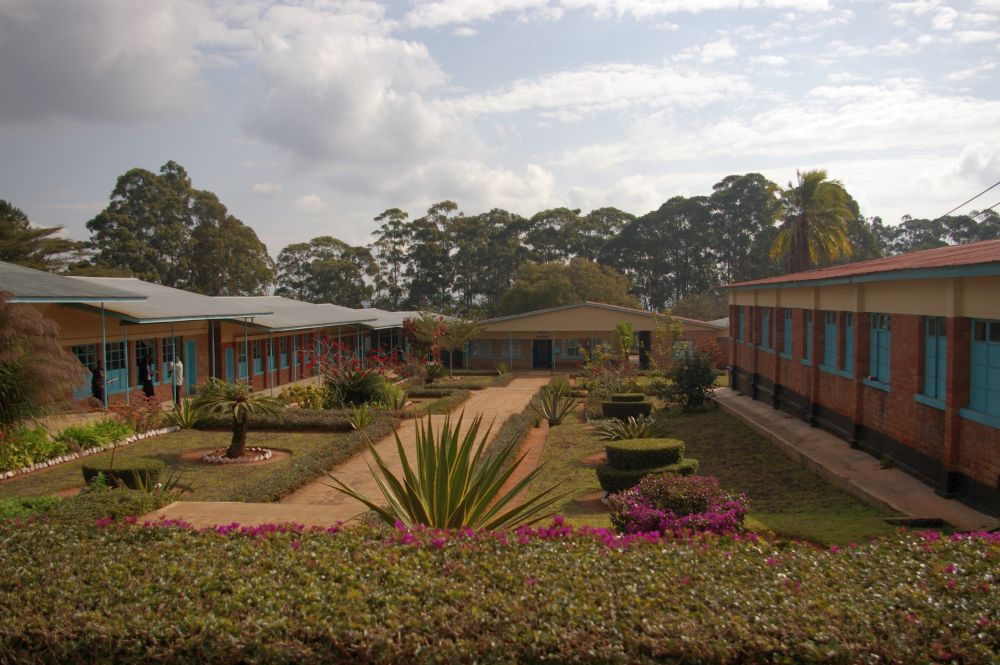
Sub-standard work
The work the volunteers do, whether they’ve received a few days of training or not, is bound to be sub-standard. Local efforts and money are spent on keeping the volunteers happy rather than on the stated goal of the project. They provide, for example, sightseeing trips or a performance by a local singing group or by schoolchildren. The calculation is that the amount coming in as donations is a net profit, even factoring in local wages paid to employees for serving the volunteers.
This article mentions an extreme example. On this student voluntourism project, the volunteers supposedly building a house did it so poorly that each night, after they stopped work, workers came and rebuilt what they had done. The intention was to prevent the students from noticing that their work had been replaced. If they’d just stayed home, they could have paid those workers to build the house properly the first time. Given how much they each spent on their trip, they could have supported the building of several more houses. But of course, that would have defeated the real purpose: to give those volunteers an adventure they could feel good about.
Certainly the counter-argument here is that people are less willing to just give the money. They want the experience of helping. They want to travel too. So volunteering will help at least a little, and it will validate their idealism.
But fulfilling that desire has other implications as well.
4. The neo-colonialist implications
The neo-colonialist overtones of voluntourism can’t be ignored. Why does gratifying our idealism or our need to feel good about ourselves take precedence over the needs of host communities in a foreign country? What obliges them to meet that need, even when it can do more harm than good? It implies that “we” i.e. people from the west, who are more often than not white-skinned, are somehow more important.
This idea that, just because we are white and/or grew up in the west and have a college education, we’re qualified to help “save the world” is nonsense. This is often referred to as the “white savior complex.” Even if you’re not white, but come from the global north, this still applies: it still is based on assumptions about your own culture’s superiority.
Unqualified
My Peace Corps experience is a good example of this. I was accepted straight out of college with a degree in history. In Malawi, I received about six weeks of language training and lessons about Malawian culture, but only a week and a half of teacher training. That was considered enough to work as a teacher in a secondary school. Of my group of volunteers who started at the same time – about 10 people, if memory serves – only one had actually gone through a complete teacher-training program. I was not at all qualified to do the job.
[A quick disclaimer: I don’t know to what extent the Peace Corps still works with untrained volunteers. They may have changed this policy since the 1980s.]
The arrogance of this astounds me, looking back, though it didn’t bother me at the time: the assumption that any college graduate from the global north is qualified to go into another country and do a job that they are completely untrained for. Would you accept a completely unqualified teacher to teach your children?
As my side project – we were all expected to take on a side project – I became the “dispensary matron”. Essentially this meant I was the school nurse for the school. I took the job without anyone at the school asking me about my training or qualifications. I had trained as an EMT, which meant I had a basic idea how to patch someone up long enough for them to get to the hospital. However, I had no training at all about medications. Yet I was given a key to the medicine cabinet and spent two years doling out paracetamol and various malaria medications.
So what did I achieve, all in all? Not much. I’m not sure, but maybe I helped a few students do well enough on exams to get into university. Perhaps I convinced a few of them to deal with constipation or diarrhea in ways that didn’t involve pills or injections. I know that one student learned not to use skin-whitening cream. Another one learned that even dark black people can get sunburnt. That’s about it.
I got a lot out of my volunteer experiences though. I felt a sense of achievement, and the satisfaction of overcoming adversity. My two-year stint gave me a sense of independence and I found my career path at the same time. It looked great on my resume too. I learned a lot about Malawi and its people, maintaining that connection ever since. I enjoyed the opportunity for international travel on someone else’s dime. And I met my husband there. In short, I got much more out of the experience than any Malawians did.
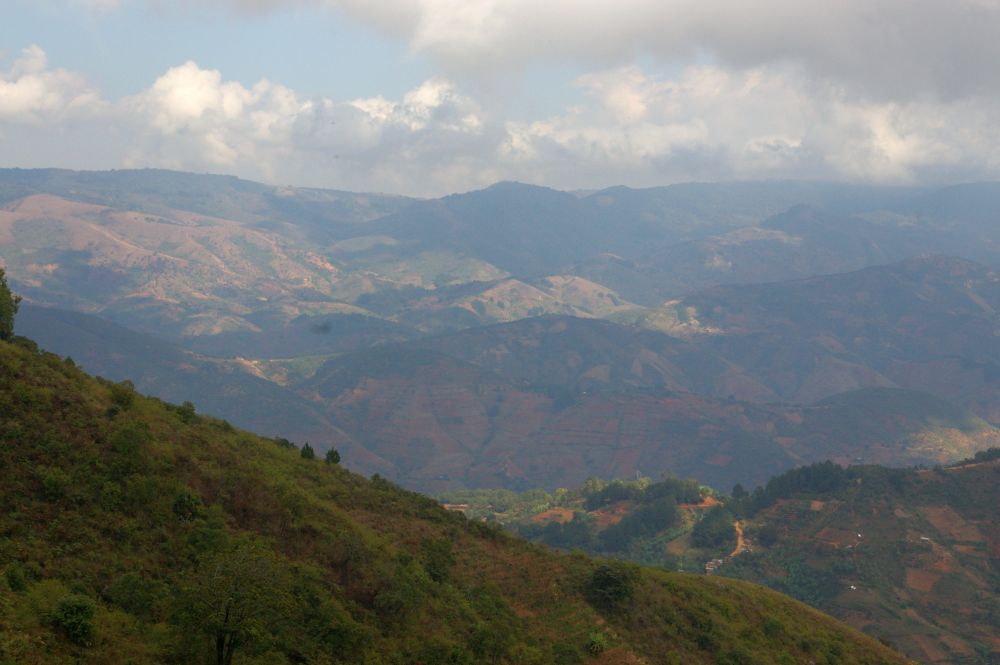
Causing harm
The thing is, voluntourism is not just about your feeling that you’re helping. It also causes long-term harm to the societies it’s meant to help. Voluntourism perpetuates itself by feeding into the idea that only white people/westerners can do the job. If volunteers are going to keep coming and taking over building tasks, childcare, English teaching or whatever, why should locals mess with the system? We white saviors bring in money and give out our labor and cash. This undermines local expertise and competes with local organizations who have much more understanding of the context. Local charitable organizations run by people of the same community are able to improve things in much more culturally-sensitive ways and less expensively. They know much better than we do what needs doing and what doesn’t.
That voluntourism can cause harm is especially true when you’re talking about the effect it can have on children. I’ve already mentioned the harm that orphanage voluntourism can do, but think about when voluntourists or just ordinary travelers interact with children. If every time that local children have contact with a white person, that person is handing out notebooks or pens or candy or playing fun games with them, what will that do to their view of the world?
As for adults, they may develop a resentment of the voluntourists’ wealth. They may not express this resentment because a) they are perfectly aware that the voluntourists want to leave feeling good about themselves and/or b) they may stand to benefit from the voluntourists’ generosity. Either way, it skews the relationship. It deepens a social and power divide where it’s not only rich as contrasted with poor but rich and white contrasted with poor and dark.
Another issue is the volunteers’ behavior. Sometimes volunteers may behave in ways that are not acceptable locally. Yet locals may feel they have to put up with it because of the money the volunteers bring in. Volunteers often assume that their own values and views of the world are the correct ones, and try to “share” them.
The most obvious example, of course, is missionary groups. They may volunteer to, for example, build a home for a poor family, but they also want to bring their religious message. Missionaries have been trying to “save souls” for hundreds of years, leading to the large-scale destruction of indigenous cultures. As expressed by @nowhitesaviors in November 2022, “Missionary-ism is fuelled by the inconsideration of our cultures, our beliefs, our freedom & right to choice in exchange for submissiveness to western ideals.”
No White Saviors, by the way, is an organization led by Black/African women based in Uganda. Their main objective is “leading the effort against the white savior industrial complex in international development, foreign aid and western religious missions.” Their Instagram account was very important in helping me, a white woman from the global north, to understand concepts like neo-colonialism and the white savior complex, and to begin to realize my own complicity in it.
Who tells the story?
Another aspect of the neo-colonialist implications of voluntourism is the inequality in telling the story. Westerners come home and tell about a place, speaking for indigenous people, so indigenous voices are not heard. This has also been going on for centuries: westerners “exploring” and “discovering” lands and drawing their own conclusions about the “exotic” and “barbaric” natives.
Nowadays that storytelling shows up in Instagram photos of young white people with crowds of smiling black children, or posing artfully in front of “shacks”, i.e. people’s homes.
This creates a two-dimensional view of the people/culture that fulfills western ideas of the “exotic.” The indigenous people become the poverty-stricken “other” that needs our help. Look at advertising for any charity working in Africa, especially at Christmas time, and how they present the locals as helpless, ill and needy.
Don’t get me wrong: some of these charities do good work that does take local wants and needs into account. But the images themselves become part of our expectation of a place. When I lived in Malawi I intentionally took pictures of mud houses with thatched roofs and not of modern buildings of concrete and glass. And when I took those pictures, I framed them so as to cut out the electric wires overhead. My photos confirmed a view of Africa as “backward”: a very incomplete view.
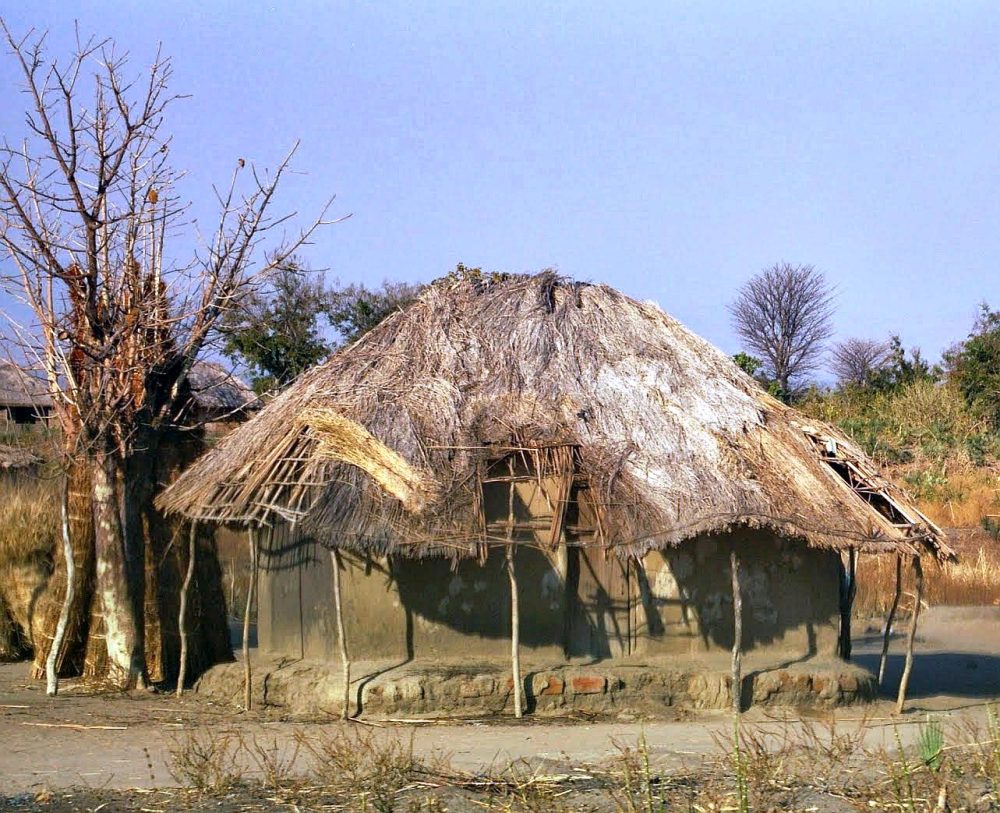
What’s worse is that black and brown people in developing countries may buy into this skewed relationship as well. They come to think of white people as superior: the bringers of wealth, knowledge and civilization. I felt this in Malawi in the deference people showed to me. When I traveled around the country during my school breaks, people seemed to see me as some sort of visiting celebrity. My Malawian colleagues at school – fully-trained teachers – treated me as if I was a trained teacher.
I should add a disclaimer here too: my Peace Corps stint was in the 1980s, and things have probably changed since then. At least, I hope so.
In any case, the fact is that the conditions that lead us – white westerners – to feel like we want to help people in other countries – mostly brown or black – were, ultimately, caused by western countries. Colonialism and systemic racism over centuries and all the horrors that followed from them are what voluntourists are trying to help alleviate. So our feeling of satisfaction at having helped is a result of colonialism and systemic racism that our own society caused!
What to do instead
Despite my criticisms, I’m not saying don’t take part in voluntourism. What I am saying is that you should choose very carefully. If you’re considering voluntourism, here’s what I’d ask you to consider first:
1. Just be a tourist
Consider just being a tourist, but spend money with local companies, hotels, etc. only, not multi-national chains. Your money, then, isn’t a charitable donation but an economic transaction. It will help stimulate the local economy. If you go with local companies, the money is more likely to stay in-country and circulate in the economy.

2. Give locally
If you must make charitable contributions, give money to local organizations, checking them out thoroughly first. A locally-run organization is much more likely to have a clear view of the problems it is addressing. It’s more likely to apply methods that are culturally-appropriate, sustainable and supported by the community. Use Instagram or other social media not to point out your own generosity, but to call out the good that the local organization is doing. Center them, not yourself.
3. No gifts to children
Don’t give gifts of any sort to children. It just reinforces this white savior idea. If you want to give something to local children, ask, for example, the principal of a local school what the schoolchildren actually need. Then buy it locally (money into the local economy) and give it to the principal to hand out to the children. If the point really is to help, then the children don’t need to know that it came from you.
(This isn’t related to voluntourism, but I also want to point out that you should not take pictures of children and post them on the internet without informed consent from their parents. Would you want strangers to post pictures of your kids online without asking you first?)
4. Share your skills
Don’t sign up for something you have no training for. If you must volunteer, wait until you have skills that you can teach to others – capacity building is the term often used – so that the community will be able to stop relying on volunteers. But first, make sure there’s not already someone there who can teach those skills: preferably someone from the same culture speaking the same language.
My husband, Albert, was a dentist working for a development-oriented non-profit organization in the northern region of Malawi, running a hospital’s dental clinic at a time when there was a severe shortage of dentists in the country. (Medically-trained Malawians, scarce as they were, had a tendency to move overseas where they could earn far more.) In the four years he was there, he trained several of his dental assistants so that they could carry out most treatments on their own. One of them runs the same dental clinic today, and another runs a clinic at another hospital. In other words, Albert made himself superfluous; he made a real impact. That should be the goal.
The professional development workshop I led in Malawi, I would argue, did some good, but only because I didn’t spend money to get there. I was vacationing there anyway and offered to lead the workshop. I had, by then, the expertise and experience to offer some value to the school’s staff – I used to lead workshops in Europe as well. Generally, though, it would be more cost-effective to find a professor in a teacher-training college in Malawi and pay them to run the workshop.
I understand that this is unlikely to happen – the school may not have the money to pay for a workshop. You may not want to pay a professor to lead that workshop for them – you’re in this for the experience, after all! So perhaps whatever training is needed wouldn’t happen if you didn’t do it. I don’t have a good answer to that conundrum. I think, though, that you should reconsider what your goals actually are. To help? Or to experience leading that workshop?
The workshop I led in Burundi – as part of a group of volunteers leading a whole range of workshops for English teachers – also helped to some extent. The teachers we worked with were thrilled to be able to take part. Most had never had an in-service training in their entire careers, so clearly the government wasn’t going to supply one. Yet it must have cost the organization that sent our group of teachers from the Netherlands a fortune to carry out the workshop. Did it have any impact in improving the quality of English education in the north of Burundi? Possibly. I don’t know. While I liked the idea of sharing some of what I’d learned as a teacher and teacher-trainer, the truth is that I was in it for the travel and the experience.
5. Do your research
If you really must volunteer, research the organization thoroughly. Better yet, cut out the middleman. Arrange your own activity by asking a locally-run organization if they could use your expertise in training locals. This is what I did for that workshop in Malawi. I knew of the organization that ran the school and asked if their staff could use what I had to offer.
As for the orphanage where my kids worked for a week, I had checked it out ahead of time and contacted it directly, rather than going through a voluntourism company. It is called Open Arms and it is not like the awful stories I described above. Most of the children have families, but these families are extremely poor. Open Arms houses and feeds the children only until they are about two or three years old. Meanwhile, community outreach helps the family get back on its feet, after which the children can return to their families. The ones who are truly orphans are essentially adopted by one of the carers. Open Arms provides the carer with a home and she raises a small group of the children as her own.
Generally speaking, this is a good system; the whole-community approach makes sense. However, I still worry about how much those small children get attached to the volunteers who come to help in the orphanage, some of whom stay much longer than my kids did. In our case, it was only a week, and for the most part we helped the carers with the daily routine – feeding the children, cleaning up after feeding, walking with the kids who could walk, and so on. The connection and love the toddlers clearly felt toward the carers impressed me. I was also happy to see that the carers did not let volunteers help with diaper-changing or bathing.
My point is just to thoroughly check the organization you’ll be working for. Don’t just trust a voluntourism company to give a full and honest report.
6. Be conscious of consequences
Make sure to consider the possible consequences of your actions. Your intentions may be pure – you truly want to help people. The consequences for the people you intend to serve can be negative, as outlined above, but they also might be negative for you. You could end up sorely disappointed at your own lack of impact. You might be better off doing some research and finding a worthy organization to give the money to.
7. Volunteer in other sectors
Voluntourism that isn’t aimed directly at people is less likely to do harm. Volunteer at a nature reserve, for example.
Here’s a tip: some of the Scottish islands offer volunteering opportunities that involve things like keeping walking trails clear and picking up litter. The populations on the islands are simply too small to support the amount of work that needs doing each summer. You could help without taking someone else’s job or falling into the white savior dynamic.
The Faroe Islands has a similar program, putting aside a few days each year when volunteers come and help with tourism-related projects like path maintenance. Similar jobs are available at many other parks and reserves in many countries.
If you want to work on behalf of animals: again, do your research. Many so-called sanctuaries are not really sanctuaries. If working or visiting in one involves touching wild animals for human entertainment, chances are that those animals have been harshly trained or drugged to tolerate interactions with humans. Look for real sanctuaries where the animals can behave as they would in the wild. The only human involvement should aim at allowing that to happen.
Another tip: volunteer on an archeological site. This article looks at some of the options in Israel. No training is required because the volunteers basically do all the grunt work while the real archeologists supervise. Then they take over when any detail work is needed.
8. Volunteer for longer periods of time
Longer periods are better than shorter. English teaching for a week won’t help, since there’s no coherent curriculum. Teach for at least a school year, preferably more.
9. Listen to community members and center them
Follow community wishes and their expressed needs and accept local community leadership. Listen to them. This isn’t about what you want or what makes you feel good or what you think they need.
Center local efforts rather than yourself. In other words, it’s not about you and how you helped a local organization. It’s about them and what they’re doing. Put them in the picture (both literally and figuratively) and get out of the way.
10. Reflect on your motivations
Most importantly, think deeply about your motivations. Why do you want to do it? Ask yourself this: if you couldn’t put it on Instagram or on your resume or get college credit for it, would you still do it? Who will get the most out of it if you do it?
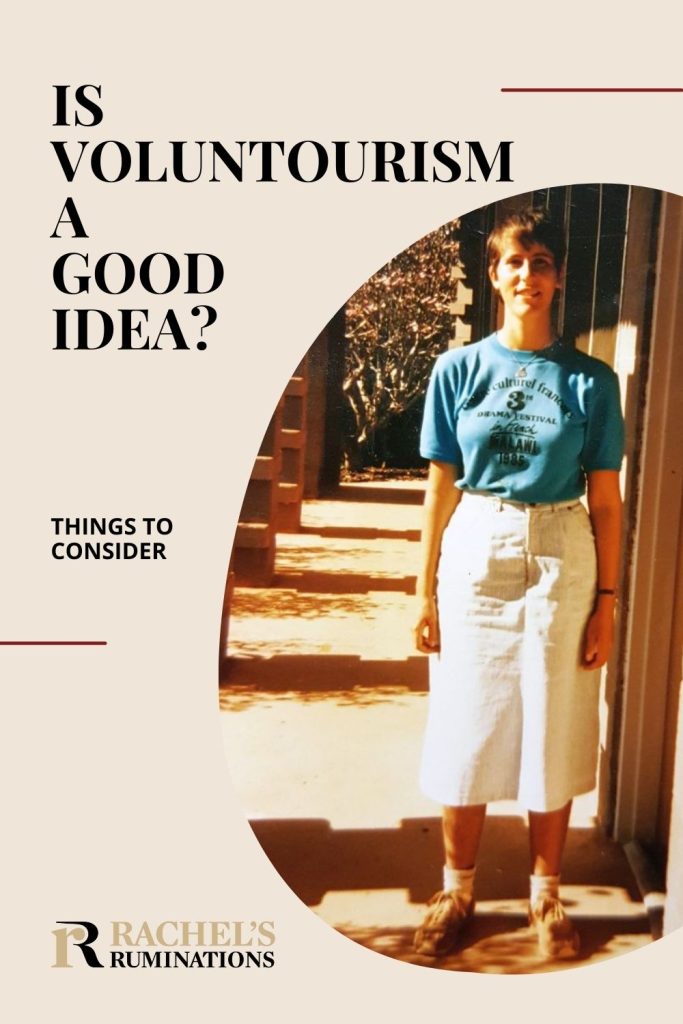
When might voluntourism be a good idea?
Do your research and ask the following questions:
- Could a local do this job?
If so, is the organization encouraging voluntourism to save money or even to gain donations? Are locals available to do the job? - If there’s no local person to do the job, and you have the skill, is there an organization that could use your expertise to train locals to do the job themselves?
- Are you qualified?
If not, don’t do it. If you are, then is there a way to pass your knowledge on to others to make volunteers obsolete? - Does the job involve children and/or an orphanage?
Don’t do it. Don’t do any job that involves contact with children unless you are going to stay at the job for a period of at least a year, preferably more. And don’t support any organization that doesn’t seriously vet those who work with children. - Is the organization non-profit or for-profit?
Don’t work for a for-profit organization, and even if it says it is not-for-profit, do your research to make sure that’s true. - Does the work involve animals?
That might be more acceptable, but do your research to make sure the organization isn’t bringing in volunteers to avoid paying locals. Also make sure that the animals are being treated humanely and not just as entertainment for tourists and/or voluntourists. - Is the volunteer opportunity near your home?
Local volunteering is much better for a number of reasons. First of all, you understand the context. You’ll have a clearer idea of whether there is a legitimate need or it’s an attempt to avoid paying an employee. Second, there is, hopefully, less of a power difference between you and the people you are helping. And you aren’t wasting large sums of money just to get to the location.
Have you ever taken part in voluntourism? Having read my thoughts about it, how do you feel about your voluntourism experience?
If this article was helpful to you in some way, please share the love by buying me a cuppa tea!
Some resources for learning more about voluntourism
Books
- Ours to Explore: Privilege, Power, and the Paradox of Voluntourism, by Pippa Biddle
- Beyond Guilt Trips, by Anu Taranath
Follow @nowhitesaviors. This organization’s feed is a real eye-opener for westerners – especially white westerners – just coming to terms with privilege and “white saviorism.”
Articles
- This is a good article with advice on how to differentiate responsible from irresponsible voluntourism providers.
- This article explores the distinction between voluntourism and volunteering, and the distinction is quite telling.
- And here are some questions to ask about a voluntourism program before you sign up.
My travel recommendations
Planning travel
- Skyscanner is where I always start my flight searches.
- Booking.com is the company I use most for finding accommodations. If you prefer, Expedia offers more or less the same.
- Discover Cars offers an easy way to compare prices from all of the major car-rental companies in one place.
- Use Viator or GetYourGuide to find walking tours, day tours, airport pickups, city cards, tickets and whatever else you need at your destination.
- Bookmundi is great when you’re looking for a longer tour of a few days to a few weeks, private or with a group, pretty much anywhere in the world. Lots of different tour companies list their tours here, so you can comparison shop.
- GetTransfer is the place to book your airport-to-hotel transfers (and vice-versa). It’s so reassuring to have this all set up and paid for ahead of time, rather than having to make decisions after a long, tiring flight!
- Buy a GoCity Pass when you’re planning to do a lot of sightseeing on a city trip. It can save you a lot on admissions to museums and other attractions in big cities like New York and Amsterdam.
- Ferryhopper is a convenient way to book ferries ahead of time. They cover ferry bookings in 33 different countries at last count.
Other travel-related items
- It’s really awkward to have to rely on WIFI when you travel overseas. I’ve tried several e-sim cards, and GigSky’s e-sim was the one that was easiest to activate and use. You buy it through their app and activate it when you need it. Use the code RACHEL10 to get a 10% discount!
- Another option I just recently tried for the first time is a portable wifi modem by WifiCandy. It supports up to 8 devices and you just carry it along in your pocket or bag! If you’re traveling with a family or group, it might end up cheaper to use than an e-sim. Use the code RACHELSRUMINATIONS for a 10% discount.
- I’m a fan of SCOTTeVEST’s jackets and vests because when I wear one, I don’t have to carry a handbag. I feel like all my stuff is safer when I travel because it’s in inside pockets close to my body.
- I use ExpressVPN on my phone and laptop when I travel. It keeps me safe from hackers when I use public or hotel wifi.


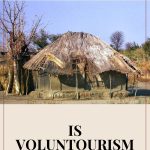



Excellent discussion of the issues around voluntourism! The whole issue of offering meaningful help to people from other cultures is so fraught and not something that gets enough attention, even as volunteer projects seem to remain very popular.